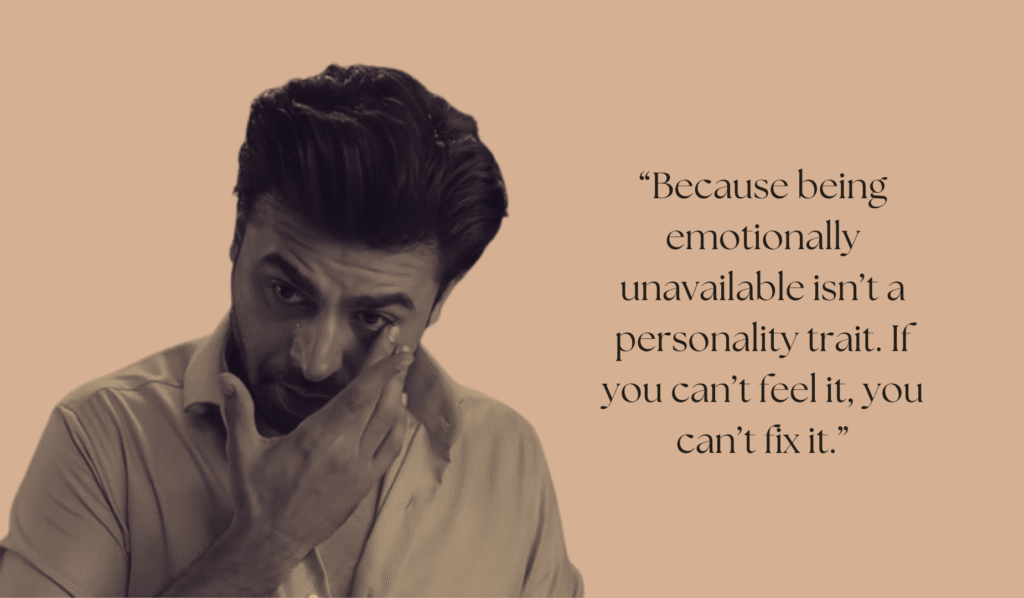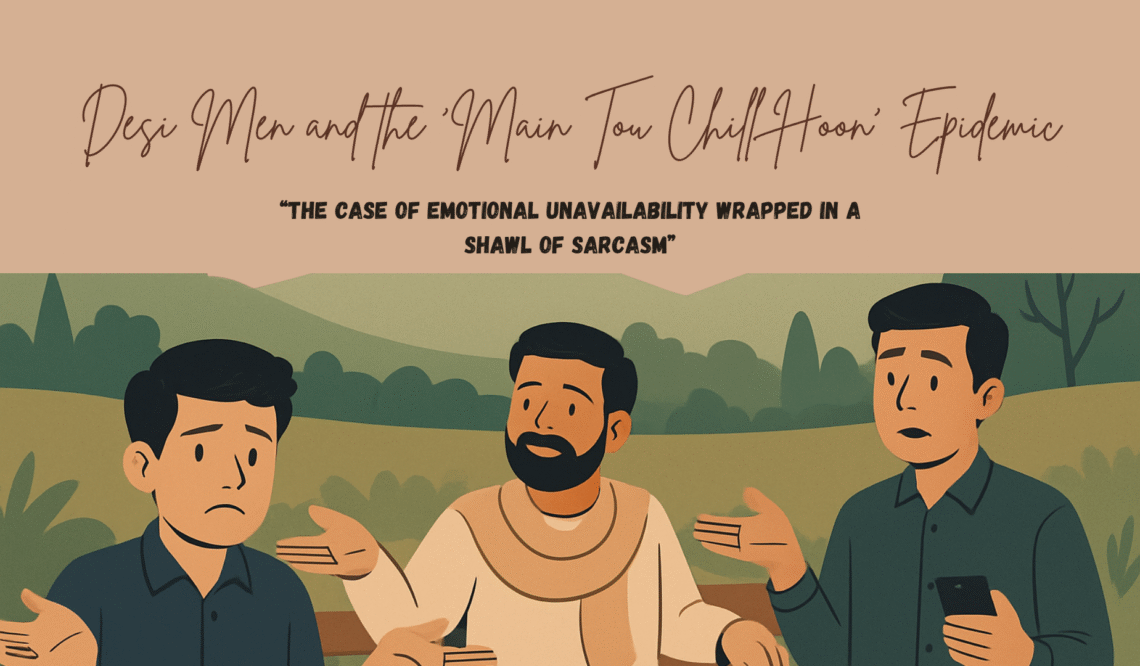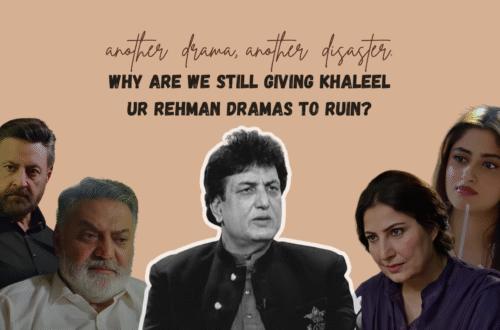You ask him what’s wrong, and he says nothing, “Main tou chill hoon.”
You tell him he hurt your feelings, and he looks confused, “Bas mazaak kar raha tha, itna serious mat lo.”
You try to have a real conversation, and he blinks like you’ve asked him to solve world hunger, “Yaar relax, tu itna overthink kyun karti hai?”
If you’ve ever interacted with a desi man between the ages of 18 and 35, chances are you’ve been hit with these lines, or some remix of them. It’s the universal, gender-neutral experience of trying to emotionally engage with a man who has made being unavailable his entire personality.
We’re talking about the “Main Tou Chill Hoon” epidemic.
It’s more than a phrase. It’s a mood. A vibe. A lifestyle. A massive cultural symptom of something deeper: emotional detachment disguised as composure.
But behind this curated coolness is a much older story, one of unprocessed emotions, inherited silence, and an entire generation of men who were never taught how to feel… so they learned to freeze.
Let’s talk about it.
What Even Is This Chill?
“Chill” used to mean laid-back, mellow, easygoing. You know, the kind of guy who doesn’t panic when there’s a cockroach in the room.
But over time, chill became something darker. Today, it’s less about calm and more about checked out.
You’ll see it everywhere:
She asks, “Why did you ignore my message?” He says, “Chill karo, kaam mein busy tha.”
She expresses an insecurity. He shrugs, “Itna sochti kyun ho yaar?”
She gets emotional. He deadpans, “Drama mat bana.”
“Chill” is now code for:
I don’t want to talk about this.
I’m uncomfortable, so I’ll detach.
I’m scared to care, so I’ll pretend I don’t.
I’ll say the bare minimum and call it healthy communication.
It’s not neutrality. It’s numbing. And it’s not even original; it’s inherited.
The Root of Chill: Emotional Starvation Dressed as Masculinity

Let’s rewind.
Desi boys grow up hearing the same script over and over:
“Rona nahi, mard ban.”
“Zyada bolna achi baat nahi hoti.”
“Feelings? Woh tou larkiyon ka kaam hai.”
They are taught to be providers, not processors. Stability is valued, but sensitivity is punished. Anger is excused, but softness is shamed. By the time they’re teenagers, many have already learned to suppress, deflect, and mask everything behind either sarcasm or silence.
Emotions?
Those get stuffed into cricket matches, late-night gaming sessions, gym reps, or humor that’s just a joke, don’t take it seriously yaar.
They aren’t taught how to sit with emotions; they’re taught to walk around them and hope they go away.
So, what happens when these boys grow up?
They become men who confuse distance with depth.
Men who’ll never say “I’m scared” but will double-text you “Wya?” at 2 a.m.
Men who’ll post a motivational quote but ghost your message about needing support.
Also Read: 8 Relationship Red Flags We Ignored in Asim & Merub’s Insta-Love Story
The Weaponized Joke: “Itna Sensitive Kyun Ban Gayi Ho?”
Let’s pause and address something more subtle, more insidious:
the emotional grenade hidden inside a “joke.”
You know the one.
- He calls you desperate in front of his friends.
- He makes fun of your appearance, your career, your voice.
- He casually mentions, “Tu tou waise bhi har baat pe ro deti hai.”
- You respond calmly, maybe even hurt.
- And he smiles, smugly: “Itna sensitive mat bano, mazaak tha.”
The Joke Defense is the desi man’s emotional invisibility cloak.
Say something harsh, then hide behind humor.
Make you feel like the crazy one for reacting.
Mock your feelings, then invalidate them when they surface.
It’s not just immature, it’s emotional manipulation.
And it’s shockingly common.
This repeated brushing off of women’s pain with “humour” is what conditions so many women to question their own emotions. It teaches them to laugh at their hurt, to shrink themselves in order to be “cool enough” for the chill guy.
Spoiler: It’s not funny.
It’s not harmless.
And no, she’s not too sensitive. You’re just too emotionally lazy.
In Relationships: Confused, Cruel, and Casually Absent

Now throw this chill guy into a relationship, and you have a full-blown emotional sitcom. Except you’re not laughing, you’re journaling and questioning your worth every weekend.
He’s affectionate, but only in private.
He listens, but only until it gets “too much.”
He likes you, but doesn’t want to label it.
He cares, but “abhi kaam kaafi pressure mein hoon.”
You’re in love with a ghost who shows up just enough to keep you confused.
And the worst part? He genuinely doesn’t see the harm. Because in his mind, he’s not being toxic, he’s being chill. And if you’re not matching that frequency? You’re dramatic. You’re “too intense.” You’re “emotional.”
But the truth is, you’re just present.
He isn’t.
The Brotherhood of Chill: Boys Who Feel, But Don’t Speak
Desi male friendships are loyal to the core. These are ride-or-die bonds formed over chai, cricket, and Call of Duty.
But emotional intimacy? Almost non-existent.
They’ll die for each other but won’t say, “I miss you.”
They’ll sit in the same room silently for hours, but won’t ask, “Are you okay?”
They’ll attend each other’s weddings, but won’t comfort each other through heartbreak.
It’s not because they don’t care.
It’s because they don’t know how to care out loud.
This emotional illiteracy is not a character flaw; it’s a cultural design.
But it has a cost.
The Real Cost of Always Being Chill
Being emotionally chill feels powerful, until it doesn’t.
Eventually, the silence backfires.
- You end up isolated from people who actually loved you.
- You bury feelings so deep, you forget how to find them.
- You lose chances to grow, to love, to heal because you’re too busy pretending nothing matters.
And then there’s the next generation.
What happens when these desi men become fathers? Husbands? Leaders?
They pass on the same blueprint: silence over softness. Distance over depth.
A chill legacy that feels cool on the outside, but cold on the inside.
Chill ≠ Calm. There’s a Difference.
Let’s be clear:
We’re not anti-calm. We love a composed king. Emotional regulation is beautiful.
But being chill doesn’t mean you’ve mastered peace; it often means you’re scared to show pain. And if your entire emotional toolkit is a sarcastic comment and a meme reply… It’s time to upgrade.
You can be:
- Calm and expressive.
- Soft and strong.
- Vulnerable and still in control.
Because the real men?
They don’t run from feelings. They ride them with grace, honesty, and maturity.
The Chill Is Overrated. Feel Something, Bro.
So the next time you catch yourself about to say, “Main tou chill hoon,”
Ask yourself:
Are you really chill? Or just afraid of being seen?
Because being numb isn’t noble, it’s just lonely.
You don’t have to be the funny guy who never breaks.
You don’t have to be the silent guy who keeps it all inside.
You don’t have to disappear just to look strong.
You can care. Cry. Speak up. Apologize.
And the best part?
You can still be cool doing it.
Because in 2025, emotional fluency is the real flex.
Not chill.
Real.




